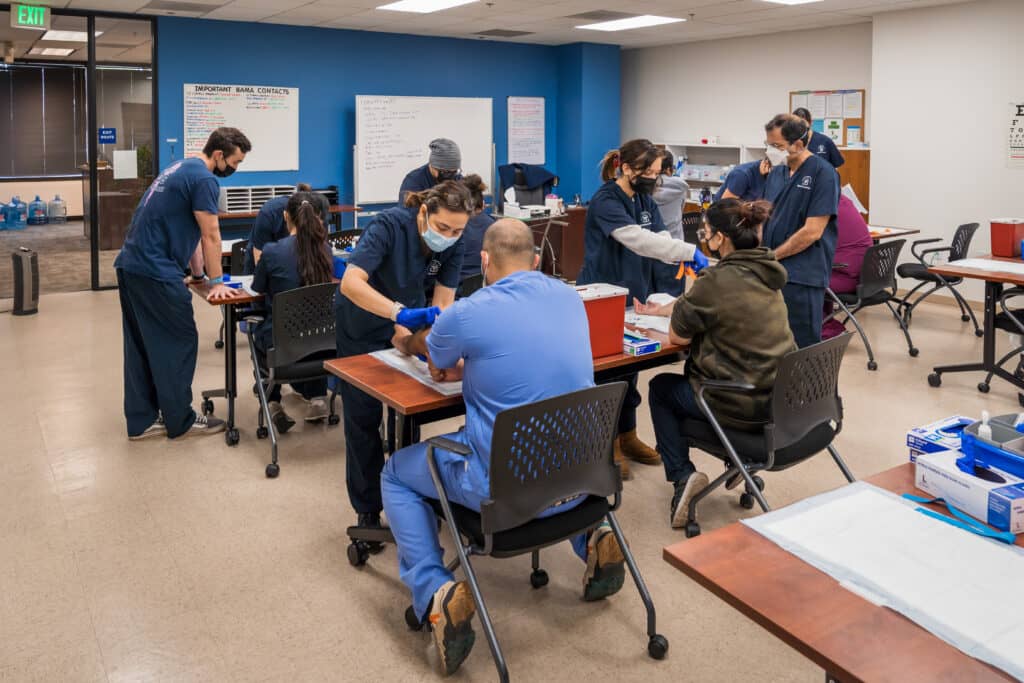Class Calendar | Call admissions on 415-943-2028
Get free phlebotomy training—exclusively for eligible Amazon Associatess / Find MA training at BAMA
Class Calendar | Call admissions on 415-943-2028

When considering a phlebotomy school, accreditation should be one of the first things you look for. Your school’s reputation will seriously impact your future. Most employers hiring phlebotomists look specifically at the school you attended and its accreditations to determine if you meet their standards. By attending a school recognized as excellent by government agencies, employment services, and professional associations, you can gain industry connections as you carve out the path to your future.
Accreditation is the process through which a school or educational program is officially recognized and deemed to meet specific standards of quality and effectiveness. However, who is responsible for the accreditation is just as crucial as the accreditation itself.
Some disreputable organizations may use fly-by-night accreditations that aren’t worth the paper they’re written on, and some may even make up their own accreditations and award them to themselves!
To determine if accreditation is reputable, you must look at who is behind it. Typically, respected phlebotomy school accreditations are given by one of three different types of entities: governments, employment services, and professional associations.
| States/Governments | Employment Services | Professional Associations |
|---|---|---|
| Accreditation at a state level ensures that a school meets minimum quality standards and protects students from being defrauded by unscrupulous organizations. These are the bare minimum qualifications you should seek. | Nonprofits and agencies responsible for job placements often work with schools known for their high post-graduation employment rates. Inclusion in their programs is a type of informal accreditation. | Professional association accreditations can give you access to niche opportunities, grants, and other benefits. |
In California, the agency responsible for approving phlebotomy programs is the California Department of Public Health (CDPH). They ensure phlebotomy programs meet specific standards and guidelines to protect patient safety and promote quality education. To obtain a CPT-1 license in California—the specific credential required to be a phlebotomist—you must attend a phlebotomy school accredited by that agency.
Another base-level standard is the Bureau for Private Postsecondary Education (BPPE) accreditation. This agency certifies that a school has met the required curriculum, ethical business practices, and program quality standards. It also keeps students from being taken advantage of by fraudulent institutions.
Another source of reputable accreditation for phlebotomy schools can be organizations like CalJobs. Specifically, schools may be included on the Eligible Training Provider List (ETPL) to provide training opportunities for displaced workers. Schools that meet CalJobs standards for this have a proven track record of success in graduating students and placing them in their careers. Attending an accredited school that is part of the CalJobs network gives you access to a broader range of employment resources, networking opportunities, and job placement assistance. In short, it will help expand your career options as a phlebotomist.
Accreditation from professional associations in healthcare is a significant indicator of quality and legitimacy for phlebotomy education programs. These associations uphold rigorous standards and requirements, ensuring accredited programs meet industry benchmarks. One notable advantage of professional association accreditation is the access to valuable resources and funding available to students. Many professional associations sponsor scholarships and provide opportunities for continued learning, allowing students to connect with industry peers and experts.
Many people hurrying to get their phlebotomy certification are intrigued by the idea of fast-paced corporate chain schools. These schools will promise to get you your phlebotomy license in a matter of weeks and may even list a few accreditations on their website. However, if you look deeper into those accreditations, you would find that they come from “mills” that grant credentials based not on quality but on how much someone is willing to pay.
Many corporate chain schools don’t offer the opportunity to get the hands-on training that you need to become a competent phlebotomist. As a result, local employers are very familiar with the certificates granted by their programs—and are not impressed. They are unlikely to give employment opportunities to individuals that hold them because they know the school isn’t providing quality education.
The best way to avoid that issue is to focus on phlebotomy school accreditation granted by reputable, known bodies in the industry. These accreditations are the stamp of approval that shows that the program you attended meets the highest standards in education.
BAMA Institute holds the phlebotomy school accreditations that California’s top healthcare employers trust. To learn more about our program, contact us.
"*" indicates required fields
© 2024 BAMA Institute. All Rights Reserved. Website by WindsAndWater